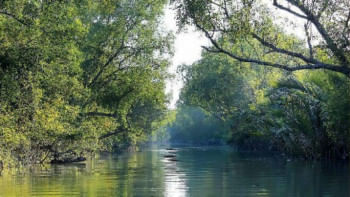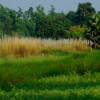To reform Bangladesh's environment sector, focus on biodiversity conservation

While Bangladesh is currently overwhelmed with reforming different sectors, including public administration, banking, education, law enforcement, and judicial systems, we are not hearing much about reforming the environment sector. This is a bit odd, since we have several environment champions as the advisors of the current interim government. There might be two reasons for that: either environment is not a priority at the moment, or environment sector doesn't need any reforming.
I believe the first point falls short since environment is one of three pillars of sustainable development, while society and economy are the other two. Therefore, failing to prioritise the environment can't be an option. Nevertheless, the environment sector currently has three major concerns: biodiversity, climate change, and pollution. Given the extremely desperate situations we are in now to fight these challenges, reforming our environmental institutions, policies, laws, and practices are crucial.
First, we need to reorient our mindset. A country having 50 percent area as wetlands and 40 percent people living in cities and towns, we must let go of the idea that increasing the percentage of forest is the main measure of biodiversity conservation. When we talk about conservation and ecosystems, we should include our natural and man-made waterbodies, green and planted areas on fallow land, arable land (having agroforestry), roadsides, rural homesteads, roof-tops, and industrial spaces in the biodiversity estimates.
Second, over the last few decades, we have lost many wetlands to urbanisation. From 1990 to 2020, Dhaka alone lost about 70 percent of its waterbodies. It may sound utopian to evict millions of people from young urban areas and re-water the lost wetlands. But it is not practical at all technologically, financially, legally, or ethically. However, we can legally bind city corporations, municipalities, real estate developers, and housing societies to make those settlements "nature hubs" by restoring old or creating new water-ways, and increasing green spaces by waterbodies, on open land, and on concrete structures, for example. Legally, we need to ensure no more urban wetlands are killed. Furthermore, we shouldn't monetise aquatic ecosystems' benefits nor should we put high taxes or transfer costs on these ecosystems to increase public revenue or discourage their conversion. This is because we now have many individuals and groups who can simply purchase ecosystems, despite what the price tags may be. A complete embargo on further switching of wetlands for other use is the only option we have.
Third, the government needs to reclaim its encroached land legally belonging to the forest department (250,000 acres) or the railway authority (4,000 acres) and bring these under restoration and plantation programmes with appropriate plant species. It may seem impossible, but given these departments' recent past successes and an absence of certain ill forces at the moment, it is feasible. Such reforestation and afforestation programmes should not be a crazy festival of planting thousands of saplings over a week, then totally losing their traces over the next few months. We must capitalise on our 30-year experience of community-based natural resource management to make such plantation sustained. To stop government-supported destruction of forest land and planted land, especially on the coast, we need to put legal measures in place which will make it difficult even for the government to allocate forest land/planted land to build cantonments, stadiums, economic zones, or settlement through harmful executive orders.
Fourth, we need to have updated, authentic figures of our forest cover and the total area of wetlands. We can brag about increasing the number of protected areas through gazette notifications, but without knowing exactly what biodiversity, small and big, we are trying to protect, the whole effort is meaningless. Thus, only counting the tiger population every 3-5 years is not enough. Similarly, fisherfolks are prevented from catching fish several times a year, but we don't have any scientific data if such fishing bans are actually increasing aquatic biodiversity. So, to ensure our biodiversity protection is evidence-driven, from now on, no terrestrial or aquatic ecosystem should be declared protected until we know details about the biodiversity itself. Additionally, these protected areas' biodiversity should be periodically checked. Any legal restrictions on harvesting natural resources like fish should be revisited based on up-to-date scientific information, to ensure if such bans are bringing envisaged benefits.
Fifth, in 2017, the Bangladesh Country Investment Plan (CIP) for Environment, Forestry and Climate Change (2016-2021) estimated a need for around $423 million every year to take biodiversity actions. In 2019, Bangladesh reported to the Convention on Biological Diversity (CBD) that, during FY2015-FY2018, the environment ministry and its departments annually spent about $15 million. Despite such poor allocations, to ensure that finance is available for conservation, we don't need to reform our laws. Three legal instruments already have funding provisions: the Ecologically Critical Area Management Rules, 2016 (Article 23), the Protected Area Management Rules, 2017 (Article 29), and the Bangladesh Biodiversity Act, 2017 (Article 36). We now need to operationalise these funds, put real money in them, and establish coherence or jurisdictional boundaries among them to avoid overlapping. By formulating a "Bangladesh Conservation Fiscal Framework," we could start outlining country's conservation finance.
Postscript: The environment ministry is currently updating the National Biodiversity Strategy and Action Plan (NBSAP). I wonder how reforming our environment sector will be reflected in that.
Dr Haseeb Md Irfanullah is an independent consultant working on environment, climate change, and research system; a visiting research fellow at the University of Liberal Arts Bangladesh (ULAB). He can be reached at [email protected]
Views expressed in this article are the author's own.
Follow The Daily Star Opinion on Facebook for the latest opinions, commentaries and analyses by experts and professionals. To contribute your article or letter to The Daily Star Opinion, see our guidelines for submission.

 For all latest news, follow The Daily Star's Google News channel.
For all latest news, follow The Daily Star's Google News channel. 









Comments